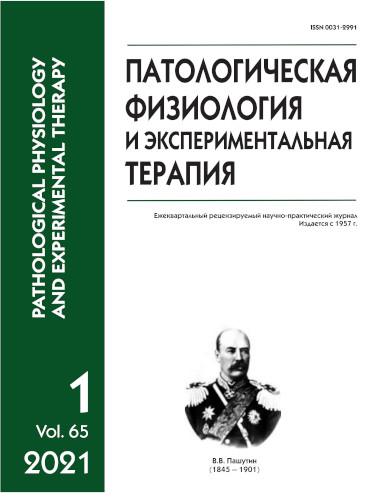Comparative effects of intragastric Lys-Arg-Arg-Lys-Pro-Gly-Pro peptides, warfarin, and acetylsalicylic acid on hemostasis indexes and blood glucose in development of metabolic syndrome in rats
DOI:
https://doi.org/10.25557/0031-2991.2021.01.52-59Keywords:
warfarin, lysine-and arginine-containing regulatory peptide, acetylsalicylic acid, hemostasis system, blood glucoseAbstract
Drugs with different structure, carbohydrates, peptides, and proteins, can produce a significant anticoagulation effect and simultaneously improve carbohydrate metabolism. The aim of this study was to compare effects of drugs with different structure, a peptide, a dioxicoumarin derivative, and acetylsalicylic acid (ASA), on coagulation and changes of carbohydrate metabolism in intragastric administration to rats. Methods. Standard methods for studying coagulation and measuring blood glucose in rats were used. Each of the study drugs (Lys-Arg-Arg-Lys-Pro-Gly-Pro peptide, warfarin, and ASA) was administered to Wistar rats intragastrically at an effective dose (100 mcg/kg for the peptide and warfarin and 1 mg/kg for ASA) for 7 days during the development of metabolic syndrome (MS) induced by a high-calorie diet (HCD). Measurements were performed at 20 and 168 h after the last administration of the drugs with continuing HCD. Results. Both at 20 and 168 h after the last administration of the peptide and ASA, platelet aggregation showed a tendency to a decrease and was 72-76% (at 20 h) and 81-66.7% (at 168 h); fibrinolysis significantly increased under the action of the peptide, ASA, and warfarin by 61-180%, 15-41%, and 14-34%, respectively. Activated partial thromboplastin time significantly increased under the action of the peptide and warfarin by 24-52% and 31-52%, respectively; blood clotting as estimated in the prothrombin time test decreased only under the action of warfarin by 12.3%; blood glucose returned to a normal level under the action of each of the three study drugs and was 4.9–6.5 mmol/l vs. 8.1-8.8 mmol/l in MS. Conclusion. The peptide, warfarin, and ASA produced different degrees of the anticoagulation and hypoglycemic effects. The peptide had the strongest anticoagulation and fibrinolytic effects, warfarin produced an anticoagulant effect only according to the prothrombin time test, and acetylsalicylic acid exerted both antiplatelet and fibrin-depolymerizing effects.Downloads
Published
2021-03-14
Issue
Section
Original research
How to Cite
[1]
2021. Comparative effects of intragastric Lys-Arg-Arg-Lys-Pro-Gly-Pro peptides, warfarin, and acetylsalicylic acid on hemostasis indexes and blood glucose in development of metabolic syndrome in rats. Patologicheskaya Fiziologiya i Eksperimental’naya Terapiya (Pathological physiology and experimental therapy). 65, 1 (Mar. 2021), 52–59. DOI:https://doi.org/10.25557/0031-2991.2021.01.52-59.






